人教版(2019)必修 第三册Unit 5 The Value of Money Discovering Useful Structures课件(共21张PPT)
文档属性
| 名称 | 人教版(2019)必修 第三册Unit 5 The Value of Money Discovering Useful Structures课件(共21张PPT) | 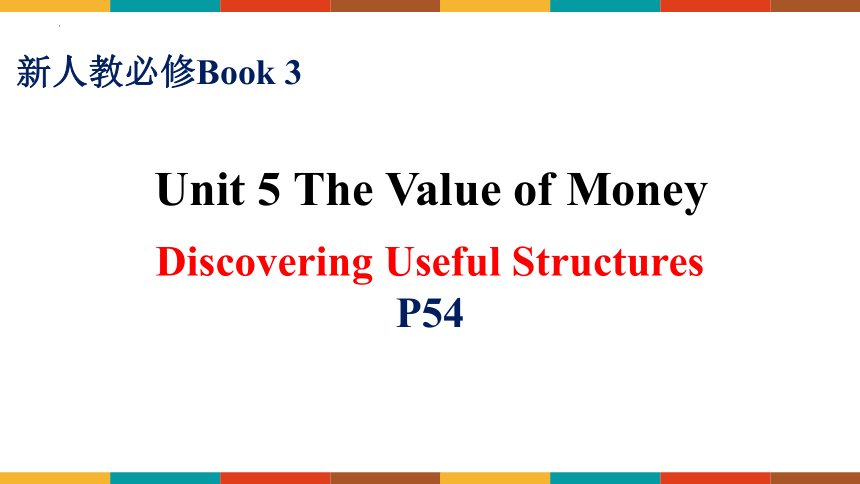 | |
| 格式 | pptx | ||
| 文件大小 | 1.0MB | ||
| 资源类型 | 教案 | ||
| 版本资源 | 人教版(2019) | ||
| 科目 | 英语 | ||
| 更新时间 | 2025-02-28 13:28:31 | ||
图片预览

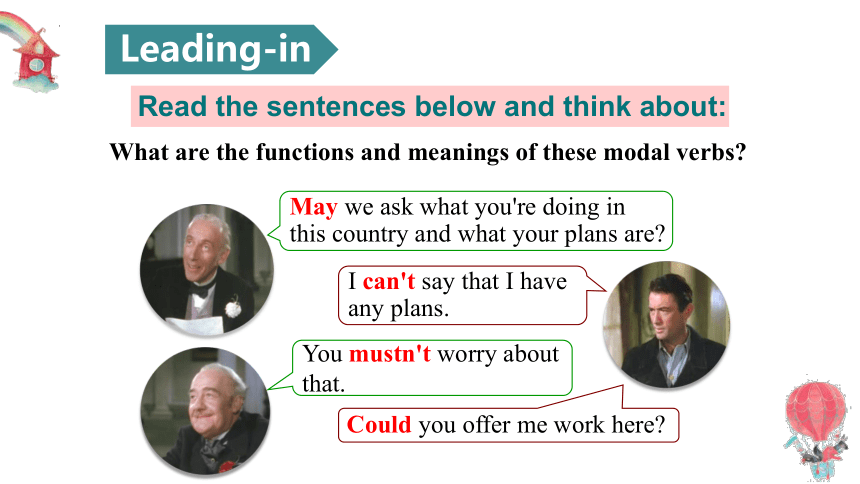

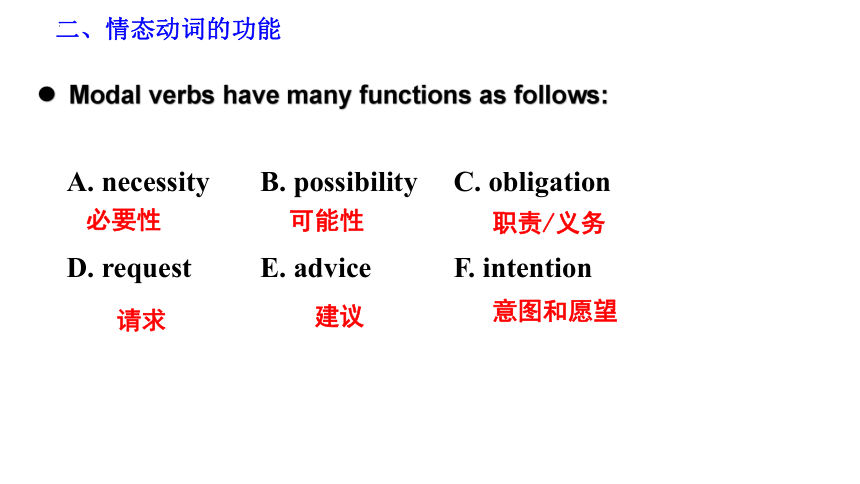
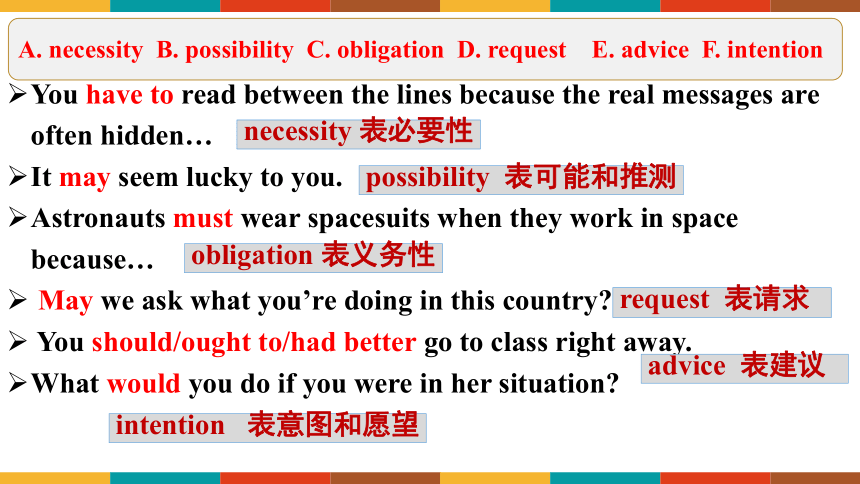
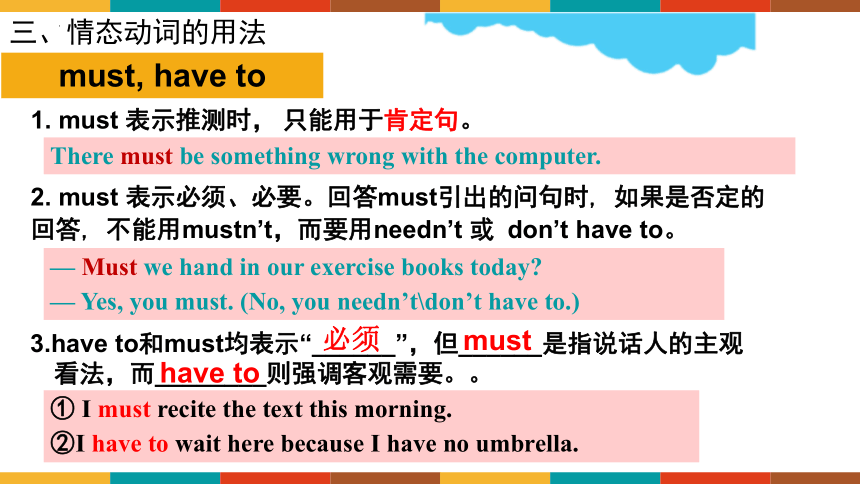
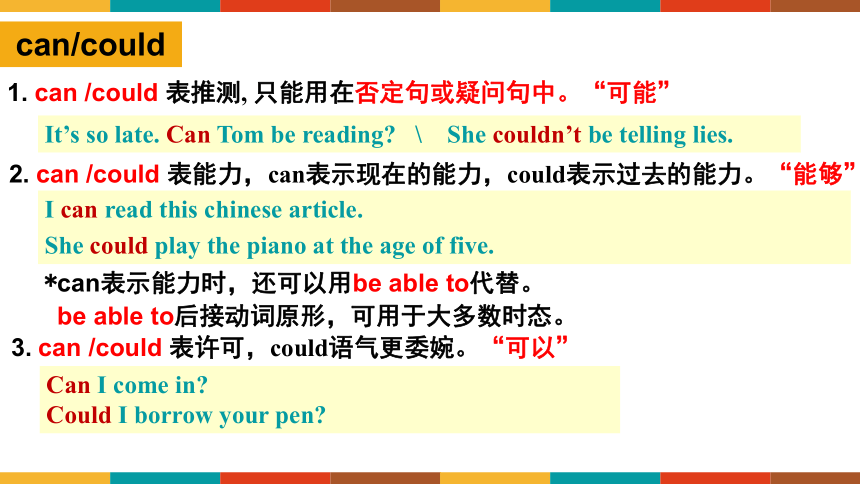
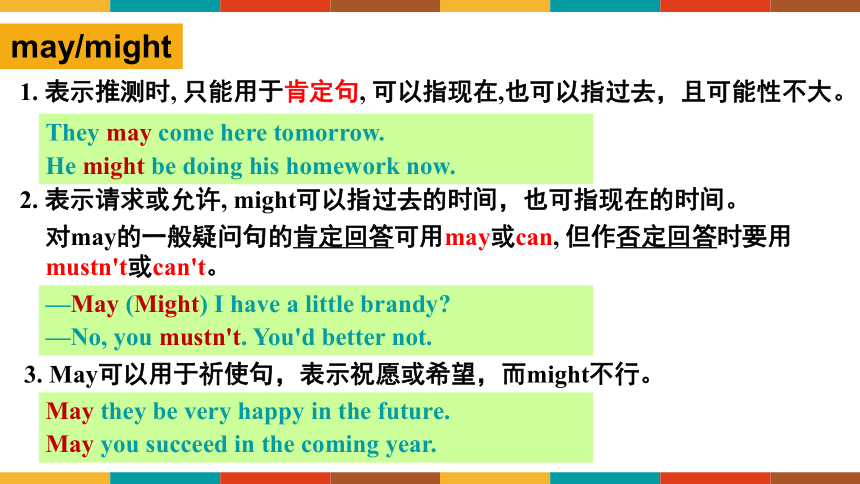
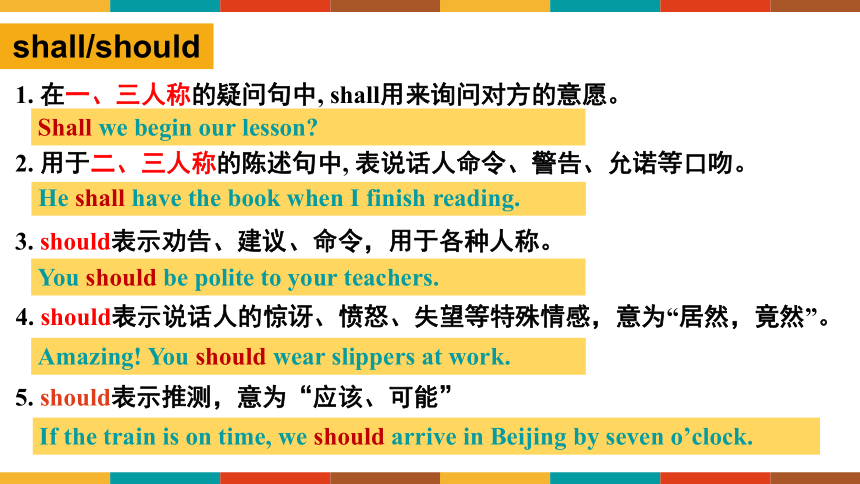
文档简介
(共21张PPT)
新人教必修Book 3
Unit 5 The Value of Money
Discovering Useful Structures P54
Leading-in
May we ask what you're doing in this country and what your plans are
I can't say that I have
any plans.
You mustn't worry about that.
Could you offer me work here
Read the sentences below and think about:
What are the functions and meanings of these modal verbs
情态动词没有人称和数的变化,即不随主语的不同而变化。
They must be in the classroom.
情态动词不能独立使用,须后接动词原形,一起构成谓语动词。
The little boy can read and write.
情态动词没有非谓语形式,即没有不定式、分词等形式,后加动词原形。
People who are familiar with the game will know this.
否定结构为:情态动词+not。
The young man can’t carry the big stone.
一、情态动词的特点
Modal verbs have many functions as follows:
A. necessity B. possibility C. obligation
D. request E. advice F. intention
二、情态动词的功能
必要性
可能性
职责/义务
请求
建议
意图和愿望
You have to read between the lines because the real messages are often hidden…
It may seem lucky to you.
Astronauts must wear spacesuits when they work in space because…
May we ask what you’re doing in this country
You should/ought to/had better go to class right away.
What would you do if you were in her situation
necessity 表必要性
possibility 表可能和推测
obligation 表义务性
request 表请求
advice 表建议
intention 表意图和愿望
A. necessity B. possibility C. obligation D. request E. advice F. intention
2. must 表示必须、必要。回答must引出的问句时, 如果是否定的
回答, 不能用mustn’t,而要用needn’t 或 don’t have to。
三、情态动词的用法
must, have to
— Must we hand in our exercise books today
— Yes, you must. (No, you needn’t\don’t have to.)
1. must 表示推测时, 只能用于肯定句。
There must be something wrong with the computer.
3.have to和must均表示“______”,但______是指说话人的主观看法,而________则强调客观需要。。
① I must recite the text this morning.
②I have to wait here because I have no umbrella.
have to
必须
must
can/could
1. can /could 表推测, 只能用在否定句或疑问句中。“可能”
It’s so late. Can Tom be reading \ She couldn’t be telling lies.
2. can /could 表能力,can表示现在的能力,could表示过去的能力。“能够”
I can read this chinese article.
She could play the piano at the age of five.
*can表示能力时,还可以用be able to代替。
be able to后接动词原形,可用于大多数时态。
3. can /could 表许可,could语气更委婉。“可以”
Can I come in
Could I borrow your pen
may/might
1. 表示推测时, 只能用于肯定句, 可以指现在,也可以指过去,且可能性不大。
They may come here tomorrow.
He might be doing his homework now.
2. 表示请求或允许, might可以指过去的时间,也可指现在的时间。
对may的一般疑问句的肯定回答可用may或can, 但作否定回答时要用mustn't或can't。
—May (Might) I have a little brandy
—No, you mustn't. You'd better not.
3. May可以用于祈使句,表示祝愿或希望,而might不行。
May they be very happy in the future.
May you succeed in the coming year.
shall/should
1. 在一、三人称的疑问句中, shall用来询问对方的意愿。
Shall we begin our lesson
2. 用于二、三人称的陈述句中, 表说话人命令、警告、允诺等口吻。
He shall have the book when I finish reading.
3. should表示劝告、建议、命令,用于各种人称。
You should be polite to your teachers.
4. should表示说话人的惊讶、愤怒、失望等特殊情感,意为“居然,竟然”。
Amazing! You should wear slippers at work.
5. should表示推测,意为“应该、可能”
If the train is on time, we should arrive in Beijing by seven o’clock.
will/would
1. 表示请求、建议等,多用于疑问句,would比will委婉客气。
Would you pass me the book
2. 表示意志、愿望和决心。
I will never do that again.
They asked if we would do that again.
ought to
1. 表示职责和义务,意为“应该”(因责任、义务等该
做),口气比should稍重。
You oughtn't to smoke so much.
2. 表示推测,暗含很大的可能性,近似于should。
Han Mei ought to know his telephone number.
He doesn't dare (to) answer.
You didn't need to do it yourself.
How dare you say I’m unfair
You needn’t come so early.
2. dare和need作实义动词时,其否定和疑问的构成需
借助do/did/does,need后面接带to的不定式,而在
疑问句和否定句中,dare后可省去to。有时态、人
称和数的变化。
1. 作情态动词时,主要用于否定句、疑问句和条件从
句中,一般不用在肯定句中。
dare/need
情态动词+ have done: 对过去的猜测
can\could have done
本可以
不可能
You _______________ (have) a better grade if you made full preparation for the exam.
I saw him just now, so he ___________________ (go) abroad.
could have had
couldn’t been gone
can’t\couldn’t have done
should have done
本该做某事(而实际上未做)
shouldn't have done
本不该做某事(而实际上做了)
你本该寻求帮助的。
You should have asked for some help.
你本不该告诉她这个消息的。
You shouldn’t have told her the news.
must have done
一定做了
I didn't hear the phone. I _______________________
(我刚才没有听到电话,我想必是睡着了。)
must have been asleep
needn't have done
本不必做而做了
He________________ to hospital, but he went just to
reassure himself.
(他本不必去医院的,去了只是想让自己放心点。 )
needn’t have gone
Read the passage and fill in the blanks with suitable modal verbs in the box.
may must can ought to might
had better would should
In the film The Million Pound Bank Note, Henry Adams is stuck in a foreign country without money and friends, and with nowhere to stay. While this situation _____ seem unusual, it can sometimes happen to travellers. In case it happens to you on a trip abroad, what ________ you do First, and most importantly, you ________stay calm. Fear _____ cause you to become confused. You need to think
may
should
must
can
Read the passage and fill in the blanks with suitable modal verbs in the box.
may must can ought to might
had better would should
clearly. Second, you should go to your nearest consulate. They ________ be able to help to some extent. Third, you ______ do well to check with some local charities. They ______offer help to travellers in need. Fourth, you _________avoid getting into trouble. You ______ think that stealing some money or food would help you, but you should not do so. Getting caught ______ ruin your life.
ought to
would
might
had better
might
would
II. The past future tense 过去将来时
一、定义
过去将来时,表示从过去某一时间来看,将要发生的
动作或存在的状态。
二、结构
1. would+动词原形
The weather forecast said it would rain, so I took my umbrella.
We heard that he would be promoted in August.
You told me that you would come to see me!
He would be on duty at the library in the afternoons.
A. Past predictions B. Past promises C. Past decisions D. Past habits
A
B
C
D
2. was/were going to+动词原形
She told me she was going to post the parcel.
*与would+动词原形相比,was/were going to+动词原
形有打算、计划的含义。
3. was/were about to do
表示说话的瞬间将要发生的动作。
We were about to go there when it begin to rain.
Complete the following sentences that describe the future using either form of the given verbs.
1. Philip bought two tickets for The Phantom of the Opera. He __________
___________________ (watch) with his girlfriend on the weekend.
2. I was so surprised at the news that David ___________________________
(play) the role of the dinosaur in the play that I gave him a hug out of joy.
3. Lily decided that she ___________________________ (settle) in New York
and pursue her dream of becoming an actress.
4. Hey, Timmy. I ________________ (call) you. But now that you are here, I
don't have to.
5. The competition was so close that no one was sure who ________________
(win)the Best Actor award
6. Jim is not here right now. He said he ______________________ (be) on
duty at the library this afternoon.
would watch
/ was going to watch
would play /was going to play
would settle / was going to settle
was going to call
would win
would be/was going to be
新人教必修Book 3
Unit 5 The Value of Money
Discovering Useful Structures P54
Leading-in
May we ask what you're doing in this country and what your plans are
I can't say that I have
any plans.
You mustn't worry about that.
Could you offer me work here
Read the sentences below and think about:
What are the functions and meanings of these modal verbs
情态动词没有人称和数的变化,即不随主语的不同而变化。
They must be in the classroom.
情态动词不能独立使用,须后接动词原形,一起构成谓语动词。
The little boy can read and write.
情态动词没有非谓语形式,即没有不定式、分词等形式,后加动词原形。
People who are familiar with the game will know this.
否定结构为:情态动词+not。
The young man can’t carry the big stone.
一、情态动词的特点
Modal verbs have many functions as follows:
A. necessity B. possibility C. obligation
D. request E. advice F. intention
二、情态动词的功能
必要性
可能性
职责/义务
请求
建议
意图和愿望
You have to read between the lines because the real messages are often hidden…
It may seem lucky to you.
Astronauts must wear spacesuits when they work in space because…
May we ask what you’re doing in this country
You should/ought to/had better go to class right away.
What would you do if you were in her situation
necessity 表必要性
possibility 表可能和推测
obligation 表义务性
request 表请求
advice 表建议
intention 表意图和愿望
A. necessity B. possibility C. obligation D. request E. advice F. intention
2. must 表示必须、必要。回答must引出的问句时, 如果是否定的
回答, 不能用mustn’t,而要用needn’t 或 don’t have to。
三、情态动词的用法
must, have to
— Must we hand in our exercise books today
— Yes, you must. (No, you needn’t\don’t have to.)
1. must 表示推测时, 只能用于肯定句。
There must be something wrong with the computer.
3.have to和must均表示“______”,但______是指说话人的主观看法,而________则强调客观需要。。
① I must recite the text this morning.
②I have to wait here because I have no umbrella.
have to
必须
must
can/could
1. can /could 表推测, 只能用在否定句或疑问句中。“可能”
It’s so late. Can Tom be reading \ She couldn’t be telling lies.
2. can /could 表能力,can表示现在的能力,could表示过去的能力。“能够”
I can read this chinese article.
She could play the piano at the age of five.
*can表示能力时,还可以用be able to代替。
be able to后接动词原形,可用于大多数时态。
3. can /could 表许可,could语气更委婉。“可以”
Can I come in
Could I borrow your pen
may/might
1. 表示推测时, 只能用于肯定句, 可以指现在,也可以指过去,且可能性不大。
They may come here tomorrow.
He might be doing his homework now.
2. 表示请求或允许, might可以指过去的时间,也可指现在的时间。
对may的一般疑问句的肯定回答可用may或can, 但作否定回答时要用mustn't或can't。
—May (Might) I have a little brandy
—No, you mustn't. You'd better not.
3. May可以用于祈使句,表示祝愿或希望,而might不行。
May they be very happy in the future.
May you succeed in the coming year.
shall/should
1. 在一、三人称的疑问句中, shall用来询问对方的意愿。
Shall we begin our lesson
2. 用于二、三人称的陈述句中, 表说话人命令、警告、允诺等口吻。
He shall have the book when I finish reading.
3. should表示劝告、建议、命令,用于各种人称。
You should be polite to your teachers.
4. should表示说话人的惊讶、愤怒、失望等特殊情感,意为“居然,竟然”。
Amazing! You should wear slippers at work.
5. should表示推测,意为“应该、可能”
If the train is on time, we should arrive in Beijing by seven o’clock.
will/would
1. 表示请求、建议等,多用于疑问句,would比will委婉客气。
Would you pass me the book
2. 表示意志、愿望和决心。
I will never do that again.
They asked if we would do that again.
ought to
1. 表示职责和义务,意为“应该”(因责任、义务等该
做),口气比should稍重。
You oughtn't to smoke so much.
2. 表示推测,暗含很大的可能性,近似于should。
Han Mei ought to know his telephone number.
He doesn't dare (to) answer.
You didn't need to do it yourself.
How dare you say I’m unfair
You needn’t come so early.
2. dare和need作实义动词时,其否定和疑问的构成需
借助do/did/does,need后面接带to的不定式,而在
疑问句和否定句中,dare后可省去to。有时态、人
称和数的变化。
1. 作情态动词时,主要用于否定句、疑问句和条件从
句中,一般不用在肯定句中。
dare/need
情态动词+ have done: 对过去的猜测
can\could have done
本可以
不可能
You _______________ (have) a better grade if you made full preparation for the exam.
I saw him just now, so he ___________________ (go) abroad.
could have had
couldn’t been gone
can’t\couldn’t have done
should have done
本该做某事(而实际上未做)
shouldn't have done
本不该做某事(而实际上做了)
你本该寻求帮助的。
You should have asked for some help.
你本不该告诉她这个消息的。
You shouldn’t have told her the news.
must have done
一定做了
I didn't hear the phone. I _______________________
(我刚才没有听到电话,我想必是睡着了。)
must have been asleep
needn't have done
本不必做而做了
He________________ to hospital, but he went just to
reassure himself.
(他本不必去医院的,去了只是想让自己放心点。 )
needn’t have gone
Read the passage and fill in the blanks with suitable modal verbs in the box.
may must can ought to might
had better would should
In the film The Million Pound Bank Note, Henry Adams is stuck in a foreign country without money and friends, and with nowhere to stay. While this situation _____ seem unusual, it can sometimes happen to travellers. In case it happens to you on a trip abroad, what ________ you do First, and most importantly, you ________stay calm. Fear _____ cause you to become confused. You need to think
may
should
must
can
Read the passage and fill in the blanks with suitable modal verbs in the box.
may must can ought to might
had better would should
clearly. Second, you should go to your nearest consulate. They ________ be able to help to some extent. Third, you ______ do well to check with some local charities. They ______offer help to travellers in need. Fourth, you _________avoid getting into trouble. You ______ think that stealing some money or food would help you, but you should not do so. Getting caught ______ ruin your life.
ought to
would
might
had better
might
would
II. The past future tense 过去将来时
一、定义
过去将来时,表示从过去某一时间来看,将要发生的
动作或存在的状态。
二、结构
1. would+动词原形
The weather forecast said it would rain, so I took my umbrella.
We heard that he would be promoted in August.
You told me that you would come to see me!
He would be on duty at the library in the afternoons.
A. Past predictions B. Past promises C. Past decisions D. Past habits
A
B
C
D
2. was/were going to+动词原形
She told me she was going to post the parcel.
*与would+动词原形相比,was/were going to+动词原
形有打算、计划的含义。
3. was/were about to do
表示说话的瞬间将要发生的动作。
We were about to go there when it begin to rain.
Complete the following sentences that describe the future using either form of the given verbs.
1. Philip bought two tickets for The Phantom of the Opera. He __________
___________________ (watch) with his girlfriend on the weekend.
2. I was so surprised at the news that David ___________________________
(play) the role of the dinosaur in the play that I gave him a hug out of joy.
3. Lily decided that she ___________________________ (settle) in New York
and pursue her dream of becoming an actress.
4. Hey, Timmy. I ________________ (call) you. But now that you are here, I
don't have to.
5. The competition was so close that no one was sure who ________________
(win)the Best Actor award
6. Jim is not here right now. He said he ______________________ (be) on
duty at the library this afternoon.
would watch
/ was going to watch
would play /was going to play
would settle / was going to settle
was going to call
would win
would be/was going to be
